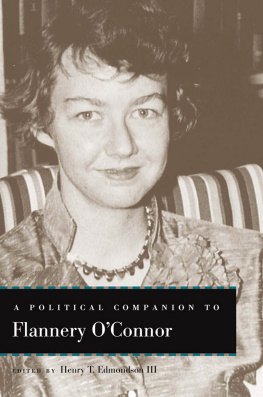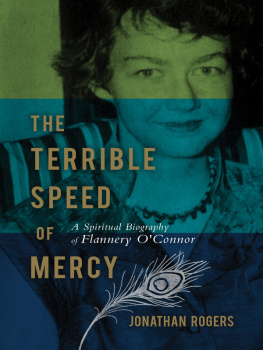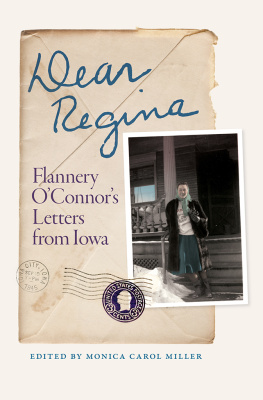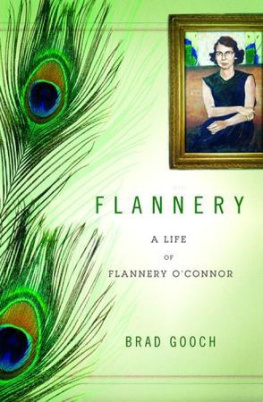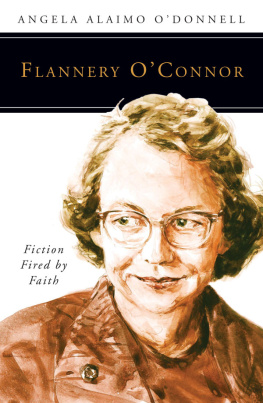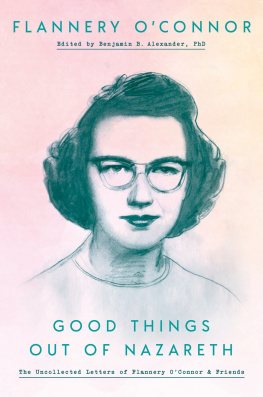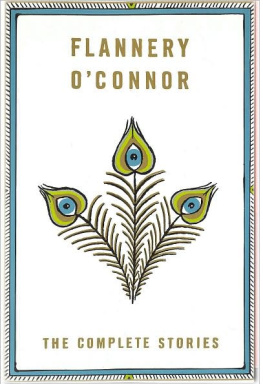A Political Companion to Flannery OConnor
A POLITICAL COMPANION TO
Flannery OConnor
EDITED BY Henry T. Edmondson III
Copyright 2017 by The University Press of Kentucky
Scholarly publisher for the Commonwealth,
serving Bellarmine University, Berea College, Centre College of Kentucky, Eastern Kentucky University, The Filson Historical Society, Georgetown College, Kentucky Historical Society, Kentucky State University, Morehead State University, Murray State University, Northern Kentucky University, Transylvania University, University of Kentucky, University of Louisville, and Western Kentucky University.
All rights reserved.
Editorial and Sales Offices: The University Press of Kentucky
663 South Limestone Street, Lexington, Kentucky 40508-4008
www.kentuckypress.com
Cataloging-in-Publication data is available from the Library of Congress.
ISBN 978-0-8131-6940-8 (hardcover : alk. paper)
ISBN 978-0-8131-6942-2 (epub)
ISBN 978-0-8131-6941-5 (pdf)
This book is printed on acid-free paper meeting the requirements of the American National Standard for Permanence in Paper for Printed Library Materials.
Manufactured in the United States of America.
| Member of the Association of
American University Presses |
Contents
Henry T. Edmondson III
John D. Sykes Jr.
Benjamin B. Alexander
Michael L. Schroeder
Margaret Earley Whitt
George Piggford, C.S.C.
Sarah Gordon
Ralph C. Wood
Mark Bosco, S.J.
Farrell OGorman
Gary M. Ciuba
Henry T. Edmondson III
John Roos
Christina Bieber Lake
John F. Desmond
Marion Montgomery
Series Foreword
Those who undertake a study of American political thought must attend to the great theorists, philosophers, and essayists. Such a study is incomplete, however, if it neglects American literature, one of the greatest repositories of the nations political thought and teachings.
Americas literature is distinctive because it is, above all, intended for a democratic citizenry. In contrast to eras when an author would aim to inform or influence a select aristocratic audience, in democratic times, public influence and education must resonate with a more expansive, less leisured, and diverse audience to be effective. The great works of Americas literary tradition are the natural locus of democratic political teaching. Invoking the interest and attention of citizens through the pleasures afforded by the literary form, many of Americas great thinkers sought to forge a democratic public philosophy with subtle and often challenging teachings that unfolded in narrative, plot, and character development. Perhaps more than any other nations literary tradition, American literature is ineluctably politicalshaped by democracy as much as it has in turn shaped democracy.
The Political Companions to Great American Authors series highlights the teachings of the great authors in Americas literary and belletristic tradition. An astute political interpretation of Americas literary tradition requires careful, patient, and attentive readers who approach the text with a view to understanding its underlying messages about citizenship and democracy. Essayists in this series approach the classic texts not with a hermeneutics of suspicion but with the curiosity of fellow citizens who believe that the great authors have something of value to teach their readers. The series brings together essays from varied approaches and viewpoints for the common purpose of elucidating the political teachings of the nations greatest authors for those seeking a better understanding of American democracy.
Patrick J. Deneen
Series Editor
Introduction
A Political Companion to Flannery OConnor offers essays to help the reader appreciate Flannery OConnors brilliance as a short story writer, novelist, essayist, and correspondent; and, her importance as a political philosopher, even if political philosophy was for OConnor an irregular and inadvertent activity. Nonetheless, her contribution to political philosophy should not be surprising: she regularly reviewed books on philosophy and theology for periodicals in the Diocese of Savannah and the Diocese of Atlanta, and she was impressively well read. Her large personal library, housed at Georgia College in Milledgeville, Georgia, includes works by Plato, Aristotle, Aquinas, Nietzsche, and Eric Voegelin, among others. Her stories, moreover, are concerned with questions of human nature, prudence, social change, equality, modernity, and justice. Her essays, posthumously collected under the heading of Mystery and Manners,
Aristotle, Voegelin, and the Political
The definition of political and politics employed in this volume is expansive and rests upon the Aristotelian notion that politics is the overarching discipline, the inquiry concerned with all areas of study having relevance to As Aristotle understood them, those subdisciplines are necessarily far-ranging and address, for example, individual virtue, friendship, family life, the nature of justice, public discourse, and the place of material goods. These concerns also encompass the manner in which we spend our leisure time and how that activity shapes character, the education of children, the education of leaders, and aesthetics. Informed by St. Thomas Aquinas and the Christian tradition, OConnor also emphasizes the essential and incontestable dignity of the ordinary man and woman, a threshold never quite reached by the ancients.
That OConnors thought might address Aristotelian concerns should not be surprising, given her keen interest in Aquinas. One reviewer, in remarking upon her essay The Nature and Aim of Fiction, describes it as a statement of universal literary theory almost equaling Aristotles Poetics.
Because OConnors college philosophy textbook dealt with modern philosophy, not ancient or medieval philosophy, her primary access to Aristotle seems to have been through Eric Voegelin, specifically Plato and Aristotle,
With these influences in mind, we might ask what may be OConnors enduring value for those interested in politics, philosophy, theology, literature, and culture. Perhaps the most conspicuous political dimension of OConnors work is her self-conscious concern with, and response to, the doctrine of nihilism as she saw it emerge and gain vigor in the twentieth century. Although OConnor conceded Nietzsches brilliance, especially appreciating his critique of modernity, his ideas nonetheless alarmed her, and she believed the German philosophers doctrine an empty promise, dangerous to personal morals and hazardous to a sound and productive social philosophy. Her anti-Nietzschean effort is most evident in her first novel, Wise Blood, and her short story Good Country People.

